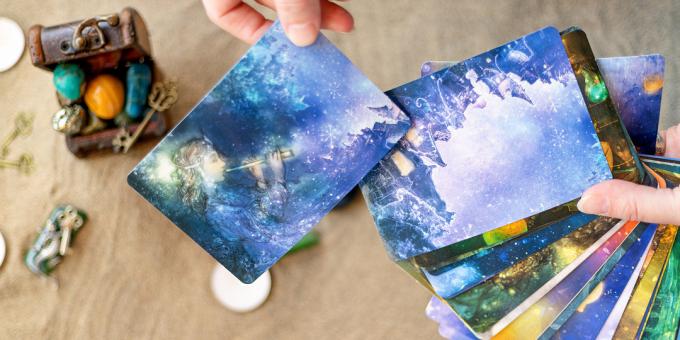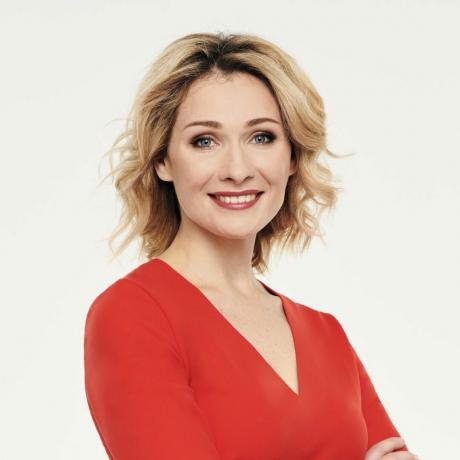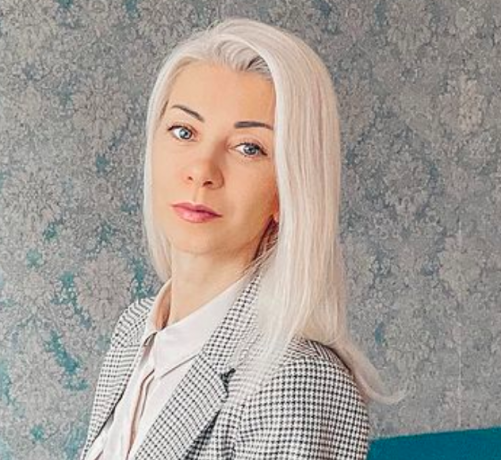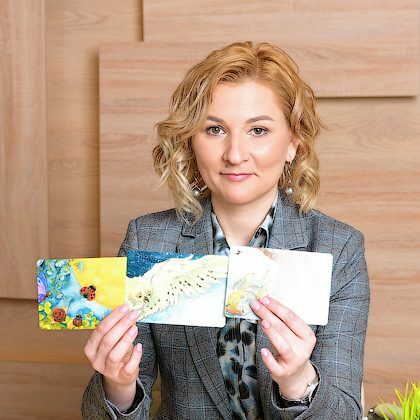How metaphorical cards help you understand yourself
Miscellaneous / / July 31, 2021
No, this is not fortune-telling, but a working tool of psychologists.
What are metaphorical cards
Their name is romantic and a little mysterious, it seems as if they are associated with magic and fortune-telling. But no. Metaphorical associative cards (MAC) are a set of pictures that are used to diagnose and work out psychological problems, as well as for learning, self-knowledge, games and creativity. Sometimes they are also called projective, O-cards or association cards.

Created the first deck of metaphorical cardsBUT. Gorobchenko, M. Evmenchik. Unique decks of metaphorical associative cards / Adukatar in 1975 the artist and art critic Eli Raman. In 1983, psychotherapist Moritz Egetmeyer saw his OH-Cards and decided to use it in his work with patients.
Since then, the MAC has become one of the tools of psychologists, and later - of coaches, teachers, creative people and all those who want to know themselves better.

Oksana Konovalova
Practicing psychologist, candidate of philosophical sciences, certified specialist in the IAC.
Initially, metaphorical cards were invented as "pocket art" and had nothing to do with psychology and psychotherapy. This allows us to think that indeed any image with the proper qualifications of a specialist can be used as a MAC.
For the first deck, now considered a classic, Eli Raman usedOH ‑ Cards / OH Publishing a variety of images and situations: landscapes, children at play, a patient at a doctor's appointment, a sad clown, a bird flying in the sky. Later, the artist created several moreA unique series of metaphoric cards / OH Publishing decks. For example, Persona, which consists of portraits, or Mythos and Saga, which reflect mythical and fabulous plots.
Now, in addition to the classic ones, there are many sets of MACs by different authors. Each deck has its own style and set of images. But in general, almost any illustrations and photographs can be used as metaphorical cards.

Maria Eril
Psychologist, psychotherapist, head of the "Psychology of Communication" direction of the business speech company.
I don't use card packs as I travel a lot around the world, go to art museums and buy postcards there. This unique collection features vibrant and rather abstract contemporary art and serves as a metaphorical map for me.
The basic principle that guides me when choosing images: they should evoke emotion and be contradictory. Moreover, often cards can stir up negative experiences, and this is normal, because we work more with pain than with something pleasant.
The main requirement for MAC is that they should spur the imagination, give reason for thought, and launch a cascade of associations. And, of course, the images on the cards should not be scary, repulsive, pornographic or capable of traumatizing a person.
Psychologists often give preference to abstract images - they are quite universal and allow not to be attached to specific images.

Oksana Konovalova
Practicing psychologist, candidate of philosophical sciences, certified specialist in the IAC.
Everything that a person sees in this world is capable of evoking associations in him. However, abstract artistic images can provide more scope for working precisely through metaphors.
Actually, Rorschach blots are also a projective technique, although it is difficult to call them full-fledged images - an accent, as in the work with MAC, it is done on the fact that the client conjectures the missing parts and elements of the whole picture in his mind.
In the Telegram channel “Life hacker»Only the best writing about technology, relationships, sports, cinema and more. Subscribe!
In our Pinterest only the best texts about relationships, sports, cinema, health and much more. Subscribe!
What are metaphorical cards
There are several IAC classifications. For example, depending on what is depicted on them, they are divided into drawing, abstract and photo cards.

Svetlana Tropmann
Practicing psychologist, art therapist, specialist in metaphorical associative cards.
There are universal decks for solving a wide range of issues and highly specialized ones, for example, for working with children, with emotions, personal boundaries, goal setting, and so on. Based on the situation and the client's request, the specialist chooses those cards that will be most suitable and will allow the subconscious to open up as efficiently as possible.
For the purpose of using MACs, they are as follows:
- Universal. These are decks with a wide range of different looks and scenes that are suitable for working through almost any situation.
- Personalized. One way or another, they depict the face or figure of a person, as well as animals. Psychologist Oksana Konovalova notes that such cards help to explore emotions, mood, reactions, character of a person. The client can talk about himself and engage in self-knowledge, or he can describe other people, exploring his attitude towards them.
- Resource. These are any positive scenes, landscapes and abstractions that are designed to inspire a person, give him strength and joy. Such cards make it possible to formulate a new solution, look at yourself differently, gain inner support and find an external resource. According to Oksana Konovalova, these decks help answer the questions "What can I use?", "Who can I contact in the current situation?"
- Special. For example, sets with pictures of children, respectively, for interaction with a client-child, or with pictures on which couples are drawn - for family counseling.
How Psychologists Use Metaphorical Cards
MAC refers to projective psychological techniques. The basis of working with this tool is such a protective mechanism of the psyche as projection.

Oksana Konovalova
Practicing psychologist, candidate of philosophical sciences, certified specialist in the IAC.
To understand what projections are, you can turn to the image of a movie projector. While the film is inside him, it is almost impossible to find out the content, “what kind of movie you have here”. In the same way, a person cannot “see” his subconscious.
However, thanks to the device of the projector, what is on the film is projected onto a white screen, and we can now see it in large detail, even in dynamics.
Metaphorical cards are images of the film on the wall. By studying them, we can understand what was on the tape. A person projects into the outside world and sees in other people, situations and objects that he cannot or does not want to see and accept in himself. Thus, understanding how he describes, for example, his environment, one can draw conclusions about what the content of his consciousness and subconsciousness is.
Specialists use MAC to get the client talking, help him formulate his request, express feelings and, through images, work through the situations that bother him.

Svetlana Tropmann
Practicing psychologist, art therapist, specialist in metaphorical associative cards.
Metaphorical cards allow a person, through a conversation with his subconscious, to understand and eliminate the causes of those life situations that bother him. IACs help to look deeply into oneself, quickly discover and change attitudes that interfere with building relationships in the family, meet a worthy partner, solve financial problems, find a calling and just become happy.
There are no hard and fast rules on how to use MAC. Therefore, a specialist can, for example, ask a client to draw out a card and simply tell what he sees, what associations he has. The images do not have a single universal interpretation, everyone, in fact, sees in them himself, his pain, his acute situations and vivid experiences. This means that the psychotherapist, when discussing the picture, “reads” the person himself.

Oksana Konovalova
Practicing psychologist, candidate of philosophical sciences, certified specialist in the IAC.
The ways of working with MAC are not universal. Almost every specialist can work with them in his own way, in the author's approach. Someone prefers "layouts" - work with a certain number of cards, which are laid out in a certain order. Someone works spontaneously, intuitively - follows the client's line of reasoning, attracting the most appropriate decks and schemes.
MAC can be used not only in individual work, but also in group psychotherapy, during various trainings and teambuildings, at coaching sessions.
In addition, Oksana Konovalova notes that the cards work great online as well. The founders of the method believe that a person should pull out the card himself, which means that when working online, one deck should be with the psychologist, and the other one should be with the client. However, practice shows that you can work differently.
For example, the card can be pulled out by a specialist; maps can be pre-scanned or photographed and offered for selection to the client; finally, there are programs that allow the client to "pull" the card online.
Who else can use metaphorical cards?
Working with projections and associations can help not only psychologists and their clients. MAC will be useful in other situations as well.
For creative people
Flashcards can help you come up with a story, find an interesting image to work on a creative project, or simply stir your imagination.
Famous creative personalities also use analogs of metaphorical cards. For example, the writer Philip Pullman, author of the book series "Dark Principles", saidPhilip Pullman: ‘I use colored pencils to show which key I’m writing in - D minor, at the moment’ / The Guardianthat the Myriorama deck helps him find inspiration - a cross between associative cards and a game. From the cards in this deck, you can make up different landscapes and scenes.
For lovers of board games
Something similar to the MAC underlies many tabletop. For example, the well-known and in some way cult game "Imaginarium" with all its additions. It is based on the fact that one participant must tell about the associations that the picture evokes in him, and the rest must guess which card he had in mind.
There are also storytelling games such as In a Kingdom and Once Upon a Time, which offer to tell a story using images of characters, places and events. Pictures in such games are also, in fact, metaphorical cards.
Anyone who wants to know themselves better
Psychologists have no consensus on whether a person should work with metaphorical cards on their own. or he may face too strong emotions and not be able to get them right without support specialist.

Maria Eril
Psychologist, psychotherapist, head of the "Psychology of Communication" direction of the business speech company.
Metaphorical cards can be used independently, alone with oneself, but with one condition: only after you have already received the experience of this practice from a psychologist.
Nevertheless, MACs are often used for independent work. Man meditates, concentrating on the images, and does exercises in which one needs to dream up in one way or another about the scenes and situations drawn. Thus, he can better understand himself, his feelings, the motives of his actions.
Who Shouldn't Use Metaphorical Cards
Psychologists believe that, in general, this is a fairly soft and safe instrument that has no contraindications. And yet, in some circumstances, you should be careful with it.

Svetlana Tropmann
Practicing psychologist, art therapist, specialist in metaphorical associative cards.
Metaphoric cards are one of the safest and most sustainable tools in psychology. They allow you to work with the psyche carefully and gently, therefore, they are suitable even for adolescents and children from 6 years old. When interacting with MAC, a person feels calm, relaxed, since there is no need to spend efforts and resources thinking about how best to describe certain events in his life.
Cards are used with caution in the treatment of people with mental illness and disabilities, since MACs are able to raise old emotional trauma that triggered the onset of the disease.
Also, experts are attentive to the choice of deck and to the characteristics of the client's personality.

Oksana Konovalova
Practicing psychologist, candidate of philosophical sciences, certified specialist in the IAC.
In general, there are no contraindications in working with metaphorical cards. There are separate themes and decks that involve the participation of a highly qualified specialist. For example, the Lidya Jacob Story deck is not suitable for a beginner or for independent work with cards. This deck often causes resistance from clients, raises very deep topics related to injuries and fears. Working with MAC at this level requires training and experience.
The COPE deck is focused on development traumatic events, so working with it can also be accompanied by certain difficulties.
"Contraindication" may be related to the characteristics of the client. Some people have not developed figurative, associative thinking. If we add to this unwillingness to work, then such a client will issue a statement that “he does not see anything and this picture does not cause him anything”.
And, of course, you should always keep in mind that MAC, like any other tool for self-knowledge, is not a universal pill that can cure any problem. If you feel very bad or you are in a difficult situation from which you cannot get out on your own, it is better to immediately seek help from a specialist.
How to work with metaphorical cards yourself
1. Choose suitable pictures
Consider Eli Raman's classic OH-Cards, Persona, Personita, Mythos, Saga and more. Or choose any of the modern decks that inspire you and seem interesting to you. You can buy them in bookstores and on websites dedicated to the IAC.
You can also "pull out" the card online or collect unusual images yourself from image repositories such as Pinterest.
2. Make up a story
Place a few pictures in front of you and try to dream up. What happens to them? Who is the main character? What is his problem and how will he try to solve it? Where will he go? In the end, you get a little story or fairy tale, which you can even write down if you want.
It's more fun to play such a game in a company of at least two or three people, but you can do it yourself.
3. Choose from two options
Metaphorical cards can help with difficult choices.

Oksana Konovalova
Practicing psychologist, candidate of philosophical sciences, certified specialist in the IAC.
Imagine that a person is faced with a dilemma. In this case, you can pull two cards out of the deck without looking. Then ask yourself “What will happen if I answer yes?”, Take one of the two cards and try to interpret it. Then ask the question "How will events develop, what will I get if I answer" no "?" and consider the second card.
Let's say a girl doesn't know quit whether her from work. She draws two cards. The left one, on which the athlete is depicted, for her means the answer "Yes, quit", and the right one, with a portrait of the child, means the answer "No, do not quit (at least not yet)."
The reasoning might be: “If I quit, I will have a hard time, but I can handle it. It can be seen that the athlete is in excellent shape, it may be difficult for him, but he can handle the load. If I don't quit, it will be an infantile decision on my part - the child in the picture is sad, it looks like he doesn't know what to do. Feels like the card with the answer “yes” responds more to me. "
4. Look for answers
This exercise will help you sort out the problem that is bothering you.

Maria Nechaeva
Psychologist, MAC-expert.
Formulate a request or remember a difficult situation from which you would like to get out with dignity. Remove the card from the universal deck, flip it over to see what is depicted on it, and ask yourself: "What is the main difficulty in solving my question?"
Consider all the details in the picture, tell who is depicted on it and what is happening. The subconscious mind will give out an associative array, and you can answer the question.
Then pull out another card and ask yourself another: "What will help me solve my problem?"
Finally, take the third card - for finding a resource and ask yourself: "Where can I find a resource to achieve the goal?"
Psychologist Svetlana Tropmann draws attention to the fact that it is very important to formulate the request correctly - so, so that you can get an answer to it, which depends on your actions and takes into account your responsibility.

Svetlana Tropmann
Practicing psychologist, art therapist, specialist in metaphorical associative cards.
For example, "When will I get married?" - this is not a request, but a fortune-telling, since in such a formulation there is no you, your figure and your contribution to the desired result. It is quite different if you ask the question "What can I do to get married?" Here you are already working with yourself and your internal attitudes, which either hinder you or help you.
5. Follow the instructions
Most decks of metaphorical cards come with brochures that contain interesting exercises - for working through difficult situations, finding answers, developing creativity. Often such instructions are made by the authors of the decks themselves - psychologists, coaches, psychotherapists. Therefore, there you can find good ways of introspection, leading questions and other useful tricks.
Read also🧐
- 7 common misconceptions about psychotherapy
- What is cognitive behavioral therapy and how quickly does it help
- 8 mental health myths to get out of your head
The authoritative scientific journal Nature wrote about the safety and effectiveness of "Sputnik V"
Scientists have shown a prototype of a protective mask that can test for coronavirus
What is coronavirus revaccination and why is it needed? Answered the main questions



